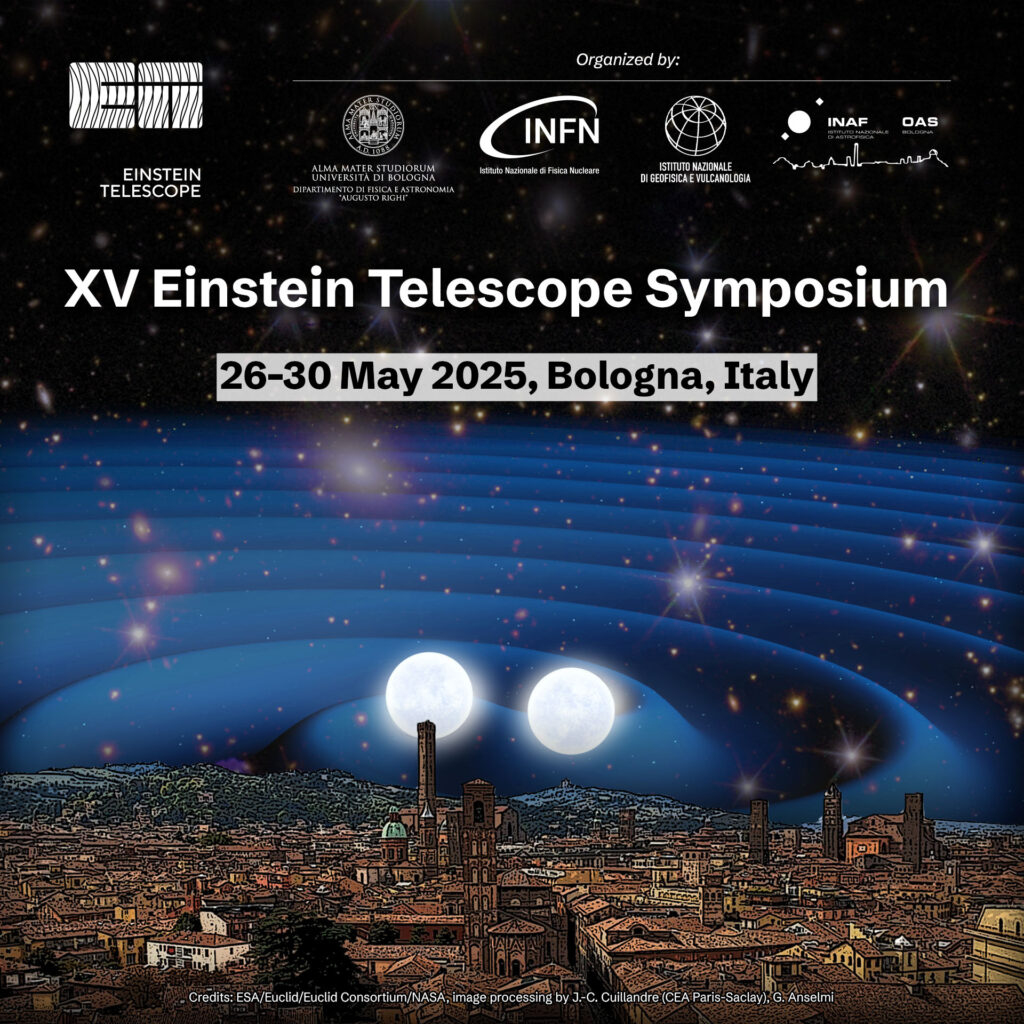International Einstein Telescope Community discusses progress May 26-30 at the University of Bologna
26.05.2025
This year, the international Einstein Telescope (ET) Community gathers for its Symposium in Bologna, May 26 to 30, bringing together researchers from across Europe and the world. ET represents an ambitious new chapter in gravitational wave astronomy, aspiring to become a leading global observatory that will probe the universe’s most profound mysteries with unprecedented precision.

“University of Bologna, INFN, INGV and INAF are very pleased to host the ET Symposium. In Bologna, a rich scientific history meets cutting edge research, and ET is a great example of this. We are delighted that our researchers are involved in several areas of ET research, and this symposium will be an important opportunity to discuss the developments of this ambitious project, which aims to become the most advanced gravitational wave observatory in the world”, says Michele Moresco, Associate Professor at Dipartimento di Fisica e Astronomia ‘Augusto Righi’ of the University of Bologna on behalf of the Local Organising Team that includes also Tommaso Chiarusi (INFN-Bologna), Marco Olivieri (INGV-Bologna) and Andrea Rossi and Giulia Stratta (INAF-OAS).
“With recent advances in planning, design, and technological development, the Einstein Telescope project is making significant progress, bolstered by the energetic support of an engaged scientific community. Researchers and engineers are actively collaborating on feasibility studies and technological innovations, making the project’s goals increasingly tangible”, says Michele Punturo, spokesperson of the Einstein Telescope Scientific Collaboration and research director at the INFN Perugia division.
„The Einstein Telescope will be one of the most important research infrastructures to be built in Europe in the coming years. INFN, which leads the ET project at the international level, together with Nikhef and in collaboration with many other European research institutions, is looking forward to welcoming the broad international community to Bologna. The symposium will be a valuable opportunity for discussion on the current state of the project and, particularly, on the scientific and programmatic pros and cons of the distributed 2L geometry versus the single site triangular geometry, whose optical designs are being finalized by the ETO task force“, says Marco Pallavicini, INFN vice president.
The ET Symposium is being co-organised by the Dipartimento di Fisica e Astronomia ‘Augusto Righi’ of the University of Bologna, the Sezione di Bologna of the Istituto Nazionale di Fisica Nucleare, the Bologna Section of the Istituto Nazionale di Geofisica e Vulcanologia, and the Istituto Nazionale di Astrofisica – Observatory of Astrophysics and Space Science of Bologna.
The Einstein Telescope (ET)
ET is a cutting-edge, next-generation observatory designed to detect gravitational waves from cosmic events like merging black holes, neutron stars, and supernovae with an accuracy previously unattainable. The international project underscores the commitment of the scientific community to push the boundaries of gravitational wave science and understand the fabric of spacetime itself. The project highlights Europe’s strong dedication to science and innovation fostering collaborative research. With its advanced design and innovative technology, ET is poised to transform our understanding of the universe and make Europe a global leader in gravitational wave research.
ET is included in the Roadmap 2021 of the European Strategy Forum on Research Infrastructures (ESFRI). It confirms the relevance of this major international project for a next-generation gravitational waves observatory for the future of research infrastructures in Europe and gravitational wave research at a global level. Currently the ET Collaboration includes 1810 researchers representing 262 institutes from 31 countries.
Public events in Bologna during the Einstein Telescope Symposium
Alongside the scientific program, a series of events and initiatives aimed at the general public will also take place in Bologna throughout the week, with a particular focus on Italy’s bid to host the Einstein Telescope.
From May 26 to 30, the exhibition “Einstein Telescope: A Glimpse into the Deep Universe” will be on display at Palazzo D’Accursio in Piazza Maggiore, Bologna.
Opening hours: Monday to Saturday from 7 a.m. to 8 p.m.; Sunday from 9 a.m. to 7 p.m.
On Thursday, May 29, 21:00, the public conference “The Underground Universe – Einstein Telescope in Sardinia” will be held at Cinema Modernissimo, Piazza Re Enzo 3, Bologna. The evening will feature Marica Branchesi (Gran Sasso Science Institute) and Massimo Carpinelli (director of EGO), accompanied by a live violin performance from Anna Tifu and live illustrations by Angelo Adamo. The event will be moderated by Italian TV host Patrizio Roversi.
Interactive VAN „Big Bang Machine„
From 29 to 30 May at Piazza Galvani , Bologna.
Hours of operation: Thursday 29, 12-21 – Friday 30, 10-19.
Further information:
https://einsteintelescope.eu
Contacts
Università di Bologna, Dipartimento di Fisica e Astronomia (DIFA)
Michele Moresco, PhD
Phone: +39 51 2095775
e-mail: michele.moresco(at)unibo.it
INFN Cagliari and Einstein Telescope IT
Matteo Serra, Communication Officer
m. +39 347 5801122
email matteo.serra(at)ca.infn.it
www.einstein-telescope.it/
ET Collaboration
Susanne Milde, Communications Office
Mobile: +49 172 3931349
Email: milde(at)mildemarketing.de